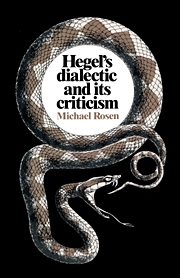Book contents
- Frontmatter
- Contents
- Preface
- A note on texts and translations
- Abbreviations of works referred to
- 1 The Interpretation of Philosophy
- 2 Determinate Negation and Immanent Critique
- 3 The Dialectical Movement
- 4 Imageless Truth
- 5 The Prose of Thought
- 6 From Being to Nothingness (and Back Again)
- 7 A Negative Dialectic?
- 8 Conclusion
- Bibliography
- Index
- Frontmatter
- Contents
- Preface
- A note on texts and translations
- Abbreviations of works referred to
- 1 The Interpretation of Philosophy
- 2 Determinate Negation and Immanent Critique
- 3 The Dialectical Movement
- 4 Imageless Truth
- 5 The Prose of Thought
- 6 From Being to Nothingness (and Back Again)
- 7 A Negative Dialectic?
- 8 Conclusion
- Bibliography
- Index
Summary
Interpreters of Hegel customarily conclude their interpretations by repeating something like Croce's question: What is Living and What is Dead in the Philosophy of Hegel? For interpreters who are wedded to a hermeneutic theory of meaning the question, indeed, is inseparable from the practice of interpretation; it is the vitality of the text which preserves its meaning and, hence, makes interpretation possible at all. However, I have a short answer to such a question: nothing.
To say this is, of course, to transgress the limitation which I have imposed on interpretation: the distinction between the experience of Thought and its characterization. I am now committing myself to an assertion about the self-development of Thought itself. In my view there is no such thing; the content-generating ‘hyperintuition’ is sheer Neo-Platonic fantasy. But – for reasons I need no longer repeat – this is not something that the interpreter can demonstrate.
But this concession is of no advantage to the established defenders of Hegel; for Adorno, Bubner, Plant, Taylor et. al. the possibility of ‘saving’ something from Hegelianism depends on it being other than speculative Neo-Platonism. This can be a matter of argument, and I have tried to give it.
However, I do not want to suggest by my negative judgement that I have a low opinion of Hegel's philosophical ability. To the contrary, he has, in the highest measure, two out of the three cardinal philosophical virtues: he is rigorous and he is original.
- Type
- Chapter
- Information
- Hegel's Dialectic and its Criticism , pp. 179 - 180Publisher: Cambridge University PressPrint publication year: 1982
- 3
- Cited by

